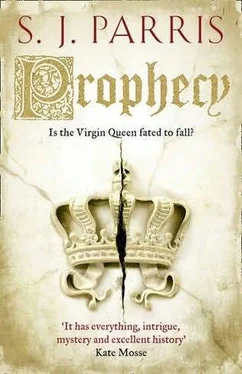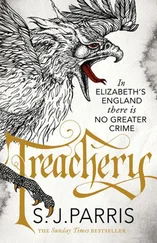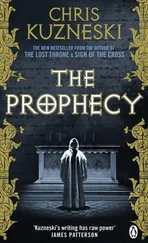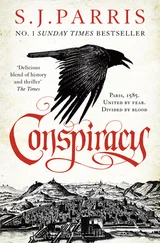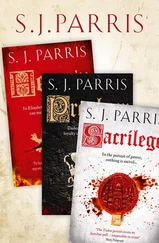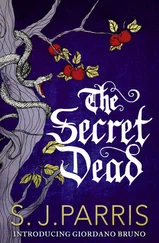I crane my neck and scour the crowds for familiar faces, but there is no sign of Abigail. At the far end of the hall, nearest to the musicians, seating has been arranged on a platform in front of the panelled wall, with a gilded throne in the centre; I presume that the queen and her attendants will make a grand entrance before the concert proper begins, with her ladies in her wake. The likelihood that I will have the chance to speak to Abigail alone is small indeed — court etiquette demands that I stay close to Castelnau and wait for his introduction — but perhaps I may be able to get a message to her requesting another meeting. I still suspect that she is holding something back, and my recent discovery about the ring makes it all the more urgent that I persuade Abigail to confide any more secrets. But beyond this, since her unexpected remark about finding a prospective lover, I have been intrigued by the possibility of seeing her again; at times I catch myself wondering if she might have said this for my benefit, though at others I tell myself I am being ridiculous. Nonetheless, I cannot suppress a frisson as I cast my eyes around the glittering crowd for a possible glimpse of red-gold hair.
Just then, the knot of people ahead of us parts and I spot, across the room, a dangerous confederacy: Henry Howard and his nephew Philip, Earl of Arundel, deep in conversation with Don Bernadino de Mendoza and Archibald Douglas, who I almost don’t recognise. He appears to have had a shave and a haircut for the occasion and looks younger and markedly cleaner than the last time I saw him. Castelnau dips his head in greeting; Howard responds with a curt nod, and turns back to say something to Mendoza, who whispers back, still staring at our party. Over Marie’s head, Castelnau glances at me, and there is fear in his eyes.
But he continues to weave his way towards the dais, keen to secure us a vantage point near where the queen will be sitting, the better to catch her eye; as I follow him through the crush, to my delight I spot Sidney standing with his uncle, the Earl of Leicester, the two of them head and shoulders above everyone else. Sidney’s hair sticks up more wildly than usual, as if he has just stepped out of a strong wind; I try to catch his eye as his gaze travels the hall. When he eventually notices me he smiles warmly, but he makes no move in my direction, and I remember with a pang that here in public, especially under Castelnau’s nose and with Courcelles watching me like a cat, I must keep a wary distance from those closest to Elizabeth. The Earl of Leicester is imposingly aristocratic in an elaborately embroidered doublet of plum velvet; he keeps his arms folded tightly across his chest as he too scans the crowd, his face with its high cheekbones and thin lips set in an earnest expression, his eyes alert. Presently he leans in to Sidney and says something that makes them both laugh; I turn away, biting down the regret that I can’t join my friend. It strikes me that, of all my acquaintance in England, there is barely anyone I can talk to openly. In this great jostle of over-dressed men, I feel suddenly isolated, and weary of acting a part.
But these thoughts are dispelled as the musicians cease their tune and into the silence that follows there rises one clear note of eight trumpets together. As if at some unspoken command, the crowd falls back to either side to create a path from the main entrance to the raised seats at the far end of the room, and I see that a carpet has been laid up the centre of the hall. Castelnau eases us through so that we stand at the front, nudging Marie forward. A hush descends on the hall, before the trumpets ring out their signal again and the double doors are flung open; the courtiers drop as one to their knees, and, glancing up, I see the white skirts of a girl scattering rose petals over the carpet to either side as she processes slowly up the aisle formed by the kneeling guests.
Raising my head as far as I dare, I look up past this girl and set eyes, for the first time, on the Queen of England. Since even before I arrived in her realm, I have carried the image of Elizabeth Tudor in my mind as a symbol of possibility: the Protestant monarch who has dared to defy three successive popes over the twenty-five years of her reign. It is foolishly presumptuous, I know, but I always believed that, if I could only find a way to make her listen or read my words, she would feel some instinctive affinity with me. Like me, she has been excommunicated for heresy and declared an enemy of the Church for her ideas; the Holy Office seeks her death as it does mine; despite the best efforts of her more rational advisers such as Walsingham and Burghley, she encourages men like John Dee, and takes a keen interest in his esoteric pursuits. If any sovereign is suited to be the patron of a heretic philosopher with unorthodox and provocative views, it is surely this open-minded, unashamedly intellectual woman who, behind the generous smiles she bestows now on her fawning courtiers, must have a will of steel to have ruled so long alone in a world of men.
Elizabeth Tudor walks at a stately pace, upright in her bearing and surprisingly graceful in her movements, given her years and the obvious weight of her ornate gown, with its skirts of thick scarlet-and-gold brocade, the scarlet bodice all embroidered with tiny garnets and pearls. At her neck she wears a small ruff of starched lace, with a stiff collar, a delicate structure of wire and finer lace, standing up behind her head; three long ropes of pearls are fixed at either side of her collar and hang in tiers across her front. Her dark red hair is an extraordinary confection, piled high and pinned in loops on top of her head, so that she must hold her neck almost without moving to maintain her balance. I suspect it is a wig. Her entire posture is an exercise in regal control. Behind the white veneer of ceruse that coats her face, her expression is inscrutable, her eyes, lips and brows painted in like a mask. She is not beautiful, but in her face is a refinement that goes beyond beauty, a look of purpose and self-possession that makes beauty seem trivial. In her hands she carries a fan of tall red feathers with a mother-of-pearl handle and she moves, as do her ladies, in a fine cloud of perfumed powder. For one ridiculous moment I find myself hoping she will glance to her left and see me, but she continues without haste towards the seats, smiling at the kneeling crowd, but always maintaining that inward-looking poise. As they pass in her wake, I notice the maids of honour, all dressed in long gowns of white silk, following her steps impeccably while their eyes stray feverishly around the room, alighting here and there on young men before flitting coyly away. Behind the maids march the older attendants, the seven Ladies of the Bedchamber, among them Lady Seaton, who happens to glance down as I look up; our eyes meet and she frowns with what I take for curiosity, before returning her gaze to the front, arranging her face back into its habitual, slightly sour expression.
It is only when the queen has mounted the dais and taken her throne with her maids gathered around her that I notice Abigail Morley is not among the women and immediately my chest clenches.
Walsingham, Burghley and a number of other grave-looking, silver-bearded men in black — the statesmen of the Privy Council, I presume — take up their positions at the sides of the dais, hands clasped behind their backs as if they were on duty. If Walsingham notices me, he gives no indication. Elizabeth gestures for her subjects to rise, which they do with varying degrees of stiffness, and when the rustling has died away, she stretches out a hand.
‘My lords, ladies and gentlemen,’ she begins, in a clear voice, pitched low for a woman but carefully measured, familiar with public speeches. ‘I have invited you here to enjoy some new compositions by Master Byrd, sung by the choristers of our Chapel Royal. The beauty of music, both sacred and secular, transcends all bounds of race and religion, and is for all.’ With this, she gives a nod, and the main doors of the hall open once more.
Читать дальше
Конец ознакомительного отрывка
Купить книгу
